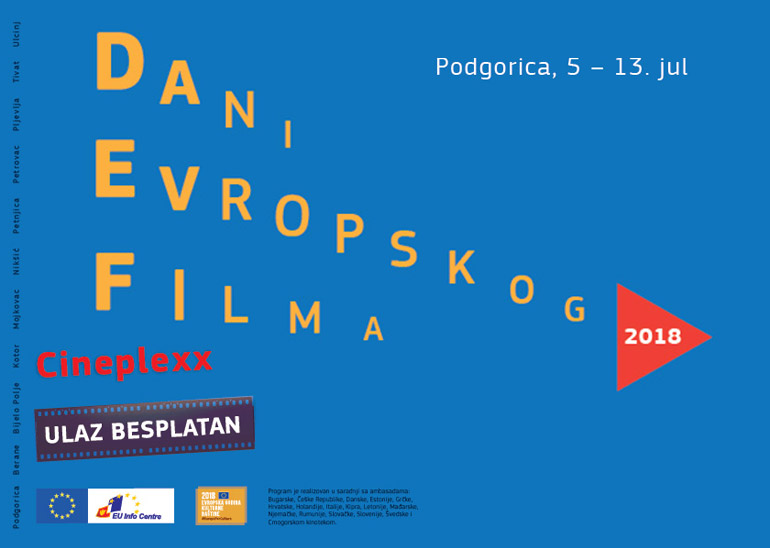The Delegation of the European Union to Montenegro, in cooperation with the embassies of Bulgaria, the Czech Republic, Denmark, Estonia, Greece, Croatia, the Netherlands, Cyprus, Latvia, Hungary, Germany, Romania, Slovakia, Slovenia, Sweden and the Montenegrin Cinémathèque, with the support of the EU Info Centre, is organising “European Film Days 2018” in Montenegro. Sixteen films of various genres, the latest European productions, will be shown in Podgorica from 5 to 13 July at Cineplexx – entrance is free. After Podgorica, audiences in the following 10 cities will have the opportunity to enjoy the films: Berane, Bijelo Polje, Budva, Kotor, Mojkovac, Niksic, Petnjica, Petrovac, Pljevlja, Tivat and Ulcinj.
You can download the catalogue here.
This year, the festival is part of the celebration of the European Year of Cultural Heritage, as proclaimed by the European Union. Moreover, following the slogan of the European Year of Cultural Heritage “Our heritage: where the past meets the future”, the festival will officially open with “The Beauty of Vice” (Ljepota poroka, 1986), the most famous film of the most important Montenegrin film director, Živko Nikolić. The day before the opening of the event, on 4 July at 11:00, the EU Info Centre, in cooperation with the Montenegrin Cinémathèque, is organising a panel discussion on Montenegrin cinema with an emphasis on the entire oeuvre of Zivko Nikolic. Actor Boro Sjepanović, as well as directors Branko Baletić and Andro Martinović will talk about what it was like to work with Živko.
Živko Nikolić is the most famous Montenegrin film director, who had a strong influence on Yugoslavian and European cinema. His films were celebrated by both critics and the public, and won several awards at European festivals.
Nikolić was a controversial and tragic figure, celebrated during his life, but also disputed, mostly by the political establishment who did not like his artistic vision of Montenegrin society and tradition. His uncompromising collision with the backwardness of the society and his precise dissection of societal change caused by modernisation were considered unpatriotic. Despite that, the public adored Nikolić’s films. His unique narrative/visual style became recognisable and popular, and quotes from his films became widely used in everyday speech. “The Beauty of Vice” is one of the most important films about the sexual liberation of women in Eastern European cinematography and at the time it was the most watched film in Israel.
Nikolić’s films and artistic sensibility are inextricably linked to and influenced by Montenegro, its people and tradition. He would say that without Montenegro and its people, he would not be able to orient himself creatively. His film heroes were ordinary people. He said: “I believe that these dark images of ordinary people are closer to the truth about mankind. If there are great people at all… Great people are fictitious and appear as something needed by little ones.”



